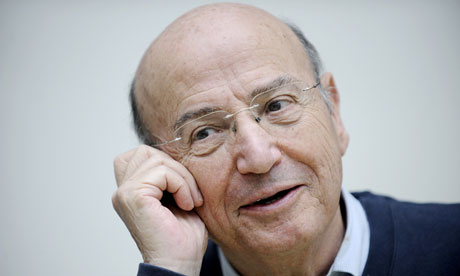
Theo Angelopoulos has been killed in a traffic accident while crossing a busy street in the middle of filming. This very fact has an enormous irony and poignancy: so much of his work is about the unfinished story, the unfinished journey, the unfinished life, and the realisation that to be unfinished is itself part of the human mystery and an essential human birthright and burden. This was part of what he conveyed to audiences, in a cinematic style that was poetry and epic poetry, steeped in the tumult of Greek history from the time of the second world war, and yet his movies were anything but frenzied or dramatic. They addressed not history's surface action but its spiritual causes and effects; he created long, dreamlike takes in long, dreamlike films, visual compositions of great beauty and delicacy, and a tempo that was largo, rising occasionally to adagio.
"This story will never get finished," says a young girl, Voula, to her brother Alexandros, at the beginning of 1988's Landscape in the Mist. The story she is trying to tell him keeps getting interrupted by the appearance of their mother, and as the siblings try to unravel the painful mystery of their father's whereabouts in Germany, Angelopoulos appears to be saying that a human story is broken at both ends: a clear, definitive closure is out of reach in front of us and behind us, with our beginnings also shrouded in mist.
His latest film was to be The Other Sea, a film that reportedly addressed the crisis of modern Greece. Will this film be finished now? Did the director leave notes that might enable someone else to do this? (It could be that the insurance necessary for the shoot provided for precisely this.) His death comes at a time when a new Greek cinema has been exciting international audiences on the festival circuit, with movies from young film-makers such as Giorgios Lanthimos and Athina Rachel Tsangari. But their work is entirely different from Angelopoulos's. Perhaps Béla Tarr might be willing to take it over – there are growing suggestions online to this effect – but it would be a mistake to compare these directors on the basis of a superficial resemblance in editing and pace. Angelopoulos was soaked in Greek history and culture; Tarr might well be astonished at the idea.
In Eternity and a Day (1998), Bruno Ganz plays a dying poet whose lifelong obsession has been to complete a 19th-century unfinished poem entitled The Free Besieged. In Ulysses' Gaze (1995), Harvey Keitel plays a director searching for three lost reels by the pioneering Macedonian film-makers Ianachia and Milton Manaki. Perhaps both these characters sense any completion that might result from their endeavours would in fact create a new incompletion – that of their own life and work, a baton passed forwards into an unknowable future.
An enormous amount of Angelopoulos's work was about the decline of modern Greece and the dwindling of its rural communities; the idea of returning to the old country, to find villages shrunk almost to nothing, is a prominent trope. Modern Greece itself has been fractured by the violence of the 20th century and on a larger historical scale it has become marginal, no longer the epicentre of classical civilisation whose language transmitted great poetry and the New Testament. Angelopoulos's films reflected this but also, I think, attempted in some way to strike back, to reassert the lost epic grandeur with huge, slow-moving films of classic amplitude.
In The Travelling Players, from 1974, a troupe of itinerant actors drifted around the war-torn country, always trying and failing to perform the folk tale Golfo the Shepherdess. They are the witnesses to the episodic tragedy of the nation, and yet mysteriously undeterred in their vocation simply to perform a kind of prehistoric myth. Angelopoulos stood back from history, often showing vast crowd scenes in longshot, especially in 2004's The Weeping Meadow, in which the figures look like chess-pieces, or perhaps even smaller, like a buzzing array of molecules. Human beings, so agitated and anxious, look like the inhabitants of a disturbed beehive – another implication of his 1986 film The Beekeeper.
Ultimately, Angelopoulos's themes are the great themes of exile and return, and the equivalent interior, spiritual sense of alienation and longing for peace. They connect with another great Greek trope: the wanderings of Odysseus. Angelopoulos's work was recurrently about this endless journeying towards a home receding over the horizon. Ulysses's gaze was Angelopoulos's gaze – long, steady and profoundly mysterious.

